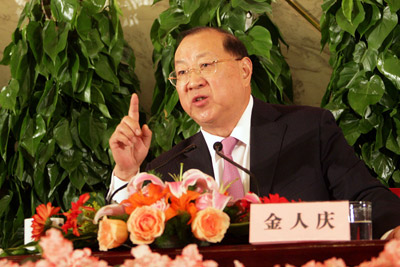
According to the Draft Enterprise Income Tax Law expected to be adopted at the ongoing annual session of the National People's Congress (NPC), China's top legislature, the income tax rate for overseas-funded companies, including those funded by Hong Kong, Macao and Taiwan investors, will be raised from 15 percent to 25 percent.
At a press conference on March 9, Minister of Finance Jin Renqing tried to calm the concerns of foreign companies worried about a spike in their tax burden and drop in competitiveness as a result.
Jin said that an initial estimation by the Ministry of Finance predicts that the income tax burden for overseas companies will increase by 41 billion yuan after the income tax rate rise. However, the increase will be evenly implemented over a five-year transitional period, which means an increase of 8 billion yuan each year.
"I believe for foreign companies investing in China, including those from Hong Kong, Macao and Taiwan, an increase of this scale is minor compared to their enormous profitability, and will not have a great impact on companies or harm their investment enthusiasm," said Jin.
The minister added that the Draft Enterprise Income Tax Law includes preferential policies for certain industries. For example, it proposes a preferential tax rate of 20 percent for small low-profit enterprises and a preferential rate of 15 percent for hi-tech enterprises receiving subsidies from the state. Foreign companies falling into the either of these two categories would only receive tax rate rises of 5 percent and 0 percent respectively.
Addressing the plenary session of the NPC Jin said China's tax rate was relatively attractive, especially in relation to neighboring countries. He told the meeting that the average enterprise income tax rate around the world is 28.6 percent while that of China's neighboring 18 countries and regions is 26.7 percent.
"The 25 percent tax rate in the draft law is slightly lower than the international average level. It is favorable for companies to be competitive and to attract new foreign investment," said Jin.
He predicted that if the law is adopted at the NPC session, which will be concluded on March 16, it will take effect as early as January 2008.
Jin also confirmed the rumors that China will establish a new state-run company in charge of investing the nation's more than $1 trillion of foreign exchange reserves. Following in the path of Temasek Holdings, a company that owns and manages the Singapore Government's direct investments, the new company will be devoted to "enhancing profitability and efficiency of China's foreign reserves operation on the basis of safe investment," according to Jin.
The new investment company will be under the direct administration of the State Council. The Chinese Government aims to separate investment of foreign exchange reserves from other functions on foreign reserves, which will remain under the State Administrate of Foreign Exchange. Lou Jiwei, who was promoted to Deputy Secretary of the State Council on March 6 and had worked as Vice Minister of Finance for nine years, is viewed as the most likely candidate to head the new government agency.
| 